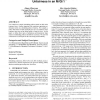Free Online Productivity Tools
i2Speak
i2Symbol
i2OCR
iTex2Img
iWeb2Print
iWeb2Shot
i2Type
iPdf2Split
iPdf2Merge
i2Bopomofo
i2Arabic
i2Style
i2Image
i2PDF
iLatex2Rtf
Sci2ools
SIGMETRICS
2003
ACM
2003
ACM
Classifying scheduling policies with respect to unfairness in an M/GI/1
It is common to evaluate scheduling policies based on their mean response times. Another important, but sometimes opposing, performance metric is a scheduling policy’s fairness. For example, a policy that biases towards small job sizes so as to minimize mean response time may end up being unfair to large job sizes. In this paper we define three types of unfairness and demonstrate large classes of scheduling policies that fall into each type. We end with a discussion on which jobs are the ones being treated unfairly. Categories and Subject Descriptors F.2.2 [Nonnumerical Algorithms and Problems]: Sequencing and Scheduling; G.3 [Probability and Statistics]: Queueing Theory; C.4 [Performance of Systems]: Performance Attributes—Unfairness General Terms Performance, Algorithms Keywords Scheduling; unfairness; M/G/1; FB; LAS; SET; feedback; least attained service; shortest elapsed time; PS; processor sharing; SRPT; shortest remaining processing time; slowdown
Related Content
| Added | 05 Jul 2010 |
| Updated | 05 Jul 2010 |
| Type | Conference |
| Year | 2003 |
| Where | SIGMETRICS |
| Authors | Adam Wierman, Mor Harchol-Balter |
Comments (0)

